This makes a logical and open-handed coupling. Certainly
it is much more generous that the original 2 CD issue of the Hiawatha
trilogy.
Coleridge-Taylor died in 1912 well before the Great
War. It seems insensitive to say it but given the fate of those who
lived through that war and who wrote in a similar idiom there is a kindness
about his early death. Had his music continued in a similar vein then
he too would have suffered an eclipse as cruel as that suffered by other
British composers of similar inclinations.
The Hiawatha triptych
is written in a style of Stanford, Bruch and Dvořák. These are
picturesque cantatas - smooth and touching diversions rather
than heaven-clawing epics of the emotions. That picturesque theme was
picked up in the many staged-costumed productions that continued well
into the 1950s under Malcolm Sargent's musical leadership and Tom Fairbairn's
stage direction. They are linked by a common style, by a choral emphasis
and by some leitmotifs such as that which is dominant in the Wedding
Feast and which reappears in the Departure - at On the
shore stood Hiawatha (CD2 tr.13).
The music is mostly for chorus and across the three
linked works - 33 separately tracked scenes - only eleven feature soloists.
Of course some of these are staggering hits such as the tenor aria Onaway
Awake Beloved. While there can be a stern-ness about the ideas there
is little intimation of tragedy - nothing comparable even with Brahms’
Tragic Overture. The chorus's role is rather to recount in lovely
undulating singing the story of Hiawatha, the tribes of the wasteland
and of his beloved Minnehaha. While the harp
provides some Tchaikovskian colour the effect is of Dvořák's Ludmilla
and Spectre's Bride and of the early Elgar cantatas such
as Caractacus and The Black Knight. The music does make
a pass at deeper things e.g. in the veldt loneliness of 'O the Long
and dreary winter' (CD1 tr 12) but too often the music swerves back
into the accustomed Stanfordian narrative groove where pages might have
escaped from Phaudrig Crohoore or The Revenge. While the
Longfellow verse might have been modelled on Kirby's translation of
the Finnish ‘Kalevala’ there is no sign of the sort of originality or
desperate intensity Sibelius brought to the Kullervo symphony
or the Lemminkainen legends. The solos tend towards lachrymose
Victorian passions: sentimentality and potplants! Expectations need
to be modest. SC-T was no revolutionary but he wrote with great mastery
within the compass of pleasing and well-crafted choralism. Despite its
outdated idiom it is a tribute to the composer that the cantatas continued
their concert life well into the 1950s. However even Sargent, that beloved
high priest of the feathered head-dress, recorded only The Wedding
Feast. The work had to wait until Kenneth Alwyn and Decca in the
early 1990s before it was recorded complete. Alwyn was of course the
natural choice as he had lead a BBC revival of the complete triptych
broadcast on 31 January 1975 from the Fairfield Hall, Croydon with Stuart
Burrows as the tenor.
I have high hopes that eventually his other cantatas
will be recorded. We need to hear Meg Blane, A Tale of Old
Japan and the Legend of Castel-Cuillé. Even more do
we need to hear the symphony and the Violin Concerto. The later is reputed
to have been recorded by Lorraine McAslan for Lyrita Recorded Edition
with the Julius Harrison Bredon Hill Rhapsody
but I doubt we will ever hear those tapes. I also know the Violin Concerto
from Sergiu Schwartz's BBC Radio 3 broadcast in the 1980s. This
is a lovely work sympathetic to the Dvořák concerto.
Hiawatha makes a very welcome return to the
catalogue after its first issue on Argo in 1991-2.
The Variations have also been issued previously
in a mixed recital including works by Butterworth and Smyth. These are
delicate and gentle inspirations with Tchaikovskian sweetness, the rodomontade
of Stanford and the orchestral dramatics of Hamilton Harty. They also
reminded me of Hurlstone's orchestral variations. If I am not mistaken
the peroration has something of a resemblance to the sunset triumphs
of Appalachia by Delius.
The notes are by Kenneth Alwyn. The full sung texts
are provided.
Essential listening for those in pursuit of the English
19th century romantics especially those who need to document one of
the cornerstones of choral society repertory in the first half of the
last century. The Variations evince true mastery and defy the hackneyed
expectations inflamed by Hiawatha.
Rob Barnett
